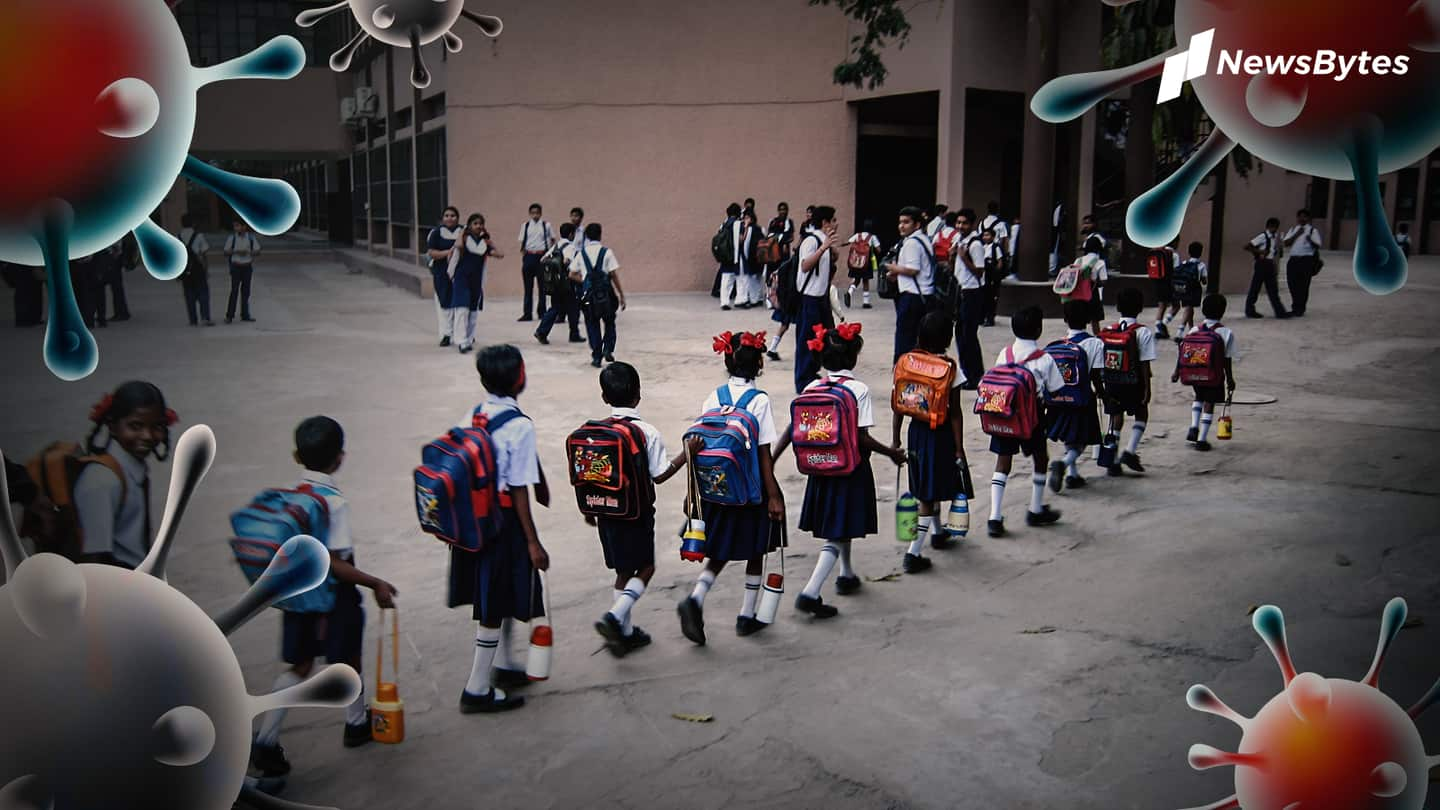
SOPs for reopening schools released; no assessment for 2-3 weeks
What's the story
The Ministry of Education on Monday issued Standard Operating Procedure (SOPs) for the reopening of schools from October 15.
These guidelines had been drafted keeping in mind the safety of children amid the coronavirus pandemic, Education Minister Ramesh Pokhriyal said.
Under the central guidelines for reopening, the government had allowed schools to reopen from October 15 under certain conditions.
Here are more details.
Central guidelines
Centre allowed states to take decision on reopening schools
Last week, the central government had unveiled fresh guidelines detailing COVID-19 restrictions.
Under the guidelines, states and union territories have been allowed to take a decision on the reopening of schools and coaching institutions after October 15 in a graded manner.
However, the guidelines continue to encourage online/distance learning, adding that a student's attendance must not be enforced and depends on parental consent.
SOPs
States/UTs may adopt or adapt cental SOPs: Pokhriyal
The Department of School Education and Literacy under the Education Ministry has issued the SOPs, Pokhriyal announced through social media on Monday.
He said states and UTs may adopt or adapt the SOPs as per local context and requirements.
The Minister added that the guidelines mainly comprise two parts: health, hygiene and safety; and learning with physical/social distancing.
Guidelines
School premises, equipment, etc. must be cleaned and disinfected
Thorough cleaning and disinfection of all areas, furniture, equipment, water tanks, etc., must be conducted.
Task teams for emergency care, support/response, general support for all stakeholders, commodity support, hygiene inspection, etc., must be formed with earmarked responsibilities.
Schools are encouraged to draft their own SOPs based on the state/UT guidelines.
Masks are mandatory on the school premises.
Guidelines
Physical distancing should be ensured
Physical distancing must be ensured in the seating plan. Functions/events should be avoided. Entry/exit timings should be staggered along with time tables.
Signages and markings should be displayed for the enforcement of physical distancing.
In case a suspected COVID-19 case is detected, actions must be taken as per protocol.
Adequate information should be collected from students, parents, and teachers on their health states.
Guidelines
Students allowed to continue schooling from home with parental consent
Students willing to study from home are allowed to do so with the consent of their parents/guardians.
Students, parents/guardians, teachers, hostel staff, and community members must be sensitized to COVID-19-related challenges.
Changes in the academic calendar for classes, breaks, and exams should be planned.
It must be ensured that all students have access to prescribed textbooks before school reopens.
Guidelines
Healthcare attendant should be present at school full-time
A full-time trained healthcare attendant, nurse, or doctor, along with a counselor should be present at school full-time (or at a contactable distance) to look after the students' physical and mental health.
Regular health check-ups for students may be organized.
Attendance and sick leave policies should be made flexible to encourage students/staff to stay at home when sick.
Guidelines
Special focus on most vulnerable students
The needs of the most vulnerable students (homeless/migrated students, students with disabilities, and students directly affected by COVID-19 through a family death/hospitalization) must be prioritized.
The nutritional requirements of children should be met to safeguard their immunity. States/UTs are advised to provide hot, cooked mid-day meals (or an equivalent Food Security Allowance) to eligible students during the closure of schools and summer vacations.
Guidelines
Schools to ensure smooth transition after reopening
Schools must ensure the smooth transition from home-based schooling during the lockdown to formal schooling.
A comprehensive calendar of activities should be made for the whole year. This plan may follow the guidelines of the NCERT's Alternative Academic Calendar.
Children may be sensitized about the pandemic through the integration of relevant concepts in science, EVS, arts, etc.
Guidelines
Students' emotional well-being must also be ensured
Teachers, school counselors, and health workers should work in unison to ensure students' emotional well-being.
There shall be no assessment for up to two-three weeks of school reopening.
The use of Information and Communication Technology (ICT) and online learning shall continue to be encouraged.
State/UT Education Departments may conduct awareness and capacity building programs for DIET (District Institutes of Education and Training) faculty members.
Twitter Post
You can view the SOPs here
Here are the highlights:
— Dr. Ramesh Pokhriyal Nishank (@DrRPNishank) October 5, 2020
As per para -1 of @HMOIndia's order no. 40-3/2020-DM-I(A) dated 30.09.2020 for reopening, States/UT Governments may take a decision in respect of reopening of schools and coaching institutions after 15th Oct in a graded manner. #SchoolGuidelines pic.twitter.com/JLfJ97qJsF